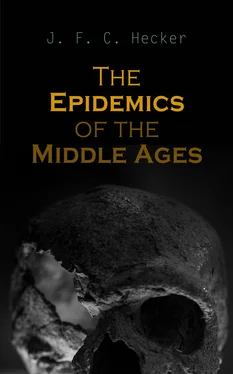1 ...7 8 9 11 12 13 ...22 Table of Contents
We have no certain measure by which to estimate the ravages of the Black Plague, if numerical statements were wanted, as in modern times. Let us go back for a moment to the 14th century. The people were yet but little civilized. The church had indeed subdued them; but they all suffered from the ill consequences of their original rudeness. The dominion of the law was not yet confirmed. Sovereigns had everywhere to combat powerful enemies to internal tranquillity and security. The cities were fortresses for their own defence. Marauders encamped on the roads.—The husbandman was a feodal slave, without possessions of his own.—Rudeness was general.—Humanity, as yet unknown to the people.—Witches and heretics were burned alive.—Gentle rulers were contemned as weak;—wild passions, severity and cruelty, everywhere predominated.—Human life was little regarded.—Governments concerned not themselves about the numbers of their subjects, for whose welfare it was incumbent on them to provide. Thus, the first requisite for estimating the loss of human life, namely, a knowledge of the amount of the population, is altogether wanting; and, moreover, the traditional statements of the amount of this loss, are so vague, that from this source likewise, there is only room for probable conjecture.
Kairo lost daily, when the plague was raging with its greatest violence, from 10 to 15,000; being as many as, in modern times, great plagues have carried off during their whole course. In China, more than thirteen millions are said to have died; and this is in correspondence with the certainly exaggerated accounts from the rest of Asia. India was depopulated. Tartary, the Tartar kingdom of Kaptschak, Mesopotamia, Syria, Armenia, were covered with dead bodies—the Kurds fled in vain to the mountains. In Caramania and Cæsarea, none were left alive. On the roads,—in the camps,—in the caravansaries,—unburied bodies alone were seen; and a few cities only (Arabian historians name Maara el nooman, Schisur and Harem) remained, in an unaccountable manner, free. In Aleppo, 500 died daily; 22,000 people, and most of the animals, were carried off in Gaza, within six weeks. Cyprus lost almost all its inhabitants 61; and ships without crews were often seen in the Mediterranean; as afterwards in the North Sea, driving about, and spreading the plague wherever they went on shore 62. It was reported to Pope Clement, at Avignon, that throughout the East, probably with the exception of China, 23,840,000 people had fallen victims to the plague 63. Considering the occurrences of the 14th and 15th centuries, we might, on first view, suspect the accuracy of this statement. How (it might be asked) could such great wars have been carried on—such powerful efforts have been made; how could the Greek empire, only a hundred years later, have been overthrown, if the people really had been so utterly destroyed?
This account is nevertheless rendered credible by the ascertained fact, that the palaces of princes are less accessible to contagious diseases than the dwellings of the multitude; and that in places of importance, the influx from those districts which have suffered least, soon repairs even the heaviest losses. We must remember, also, that we do not gather much from mere numbers without an intimate knowledge of the state of society. We will, therefore, confine ourselves to exhibiting some of the more credible accounts relative to European cities.
| In Florence there died of the Black Plague |
60,000 64 |
| In Venice |
100,000 65 |
| In Marseilles, in one month |
16,000 66 |
| In Siena |
70,000 67 |
| In Paris |
50,000 68 |
| In St. Denys |
14,000 69 |
| In Avignon |
60,000 70 |
| In Strasburg |
16,000 71 |
| In Lübeck |
9,000 72 |
| In Basle |
14,000 |
| In Erfurt, at least |
16,000 |
| In Weimar |
5,000 73 |
| In Limburg |
2,500 74 |
| In London, at least |
100,000 75 |
| In Norwich |
51,100 76 |
| To which may be added— |
|
| Franciscan Friars in Germany |
124,434 77 |
| Minorites in Italy |
30,000 78 |
This short catalogue might, by a laborious and uncertain calculation, deduced from other sources, be easily further multiplied, but would still fail to give a true picture of the depopulation which took place. Lübeck, at that time the Venice of the North, which could no longer contain the multitudes that flocked to it, was thrown into such consternation on the eruption of the plague, that the citizens destroyed themselves as if in frenzy.
Merchants whose earnings and possessions were unbounded, coldly and willingly renounced their earthly goods. They carried their treasures to monasteries and churches, and laid them at the foot of the altar; but gold had no charms for the monks, for it brought them death. They shut their gates; yet, still it was cast to them over the convent walls. People would brook no impediment to the last pious work to which they were driven by despair. When the plague ceased, men thought they were still wandering among the dead, so appalling was the livid aspect of the survivors, in consequence of the anxiety they had undergone, and the unavoidable infection of the air 79. Many other cities probably presented a similar appearance; and it is ascertained that a great number of small country towns and villages which have been estimated, and not too highly, at 200,000 80, were bereft of all their inhabitants.
In many places in France not more than two out of twenty of the inhabitants were left alive 81, and the capital felt the fury of the plague, alike in the palace and the cot.
Two queens 82, one bishop 83, and great numbers of other distinguished persons, fell a sacrifice to it, and more than 500 a day died in the Hôtel-Dieu, under the faithful care of the sisters of charity, whose disinterested courage, in this age of horror, displayed the most beautiful traits of human virtue. For although they lost their lives, evidently from contagion, and their numbers were several times renewed, there was still no want of fresh candidates, who, strangers to the unchristian fear of death, piously devoted themselves to their holy calling.
The churchyards were soon unable to contain the dead 84, and many houses, left without inhabitants, fell to ruins.
In Avignon, the pope found it necessary to consecrate the Rhone, that bodies might be thrown into the river without delay, as the churchyards would no longer hold them 85; so likewise, in all populous cities, extraordinary measures were adopted, in order speedily to dispose of the dead. In Vienna, where for some time 1200 inhabitants died daily 86, the interment of corpses in the churchyards and within the churches, was forthwith prohibited; and the dead were then arranged in layers, by thousands, in six large pits outside the city 87, as had already been done in Cairo, and Paris. Yet, still many were secretly buried; for at all times, the people are attached to the consecrated cemeteries of their dead, and will not renounce the customary mode of interment.
In many places, it was rumoured that plague patients were buried alive 88, as may sometimes happen through senseless alarm and indecent haste; and thus the horror of the distressed people was everywhere increased. In Erfurt, after the churchyards were filled, 12,000 corpses were thrown into eleven great pits; and the like might, more or less exactly, be stated with respect to all the larger cities 89. Funeral ceremonies, the last consolation of the survivors, were everywhere impracticable.
Читать дальше










